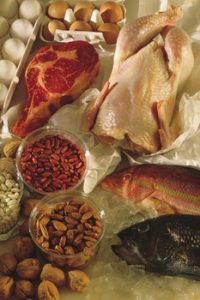Healthy eating is vital for the management of diabetes and can make a difference in controlling blood sugar levels and preventing the long-term effects of the condition.
A 2,200-calorie diabetic diet refers to eating a maximum of 2,200 calories per day. This diet is commonly used by diabetes patients to lose weight, control blood glucose, or lower the risk of developing complications such as heart problems.
- Blood sugar refers to the amount of simple sugar (glucose) in the blood. Glucose mainly comes from carbohydrates and it mainly provides energy in the body.
- Most diabetic diets are designed to limit the number of carbohydrates, protein, and fat you eat. A 2,200-calorie diet is significantly low in fat and calories.
Importance of a Healthy Diet for Diabetes

In order to lose weight, your body needs to use up more calories through activity or you may need to eat fewer calories. To gain weight, you need to supply your body with more calories than it uses up.
A comprehensive diabetes care team (dietitian, physician, and registered nurse) will help you create a meal plan that provides your body with the right amount of calories it needs each day as well as the level of activity needed, depending on your goals.
After creating your diabetes meal plan, always check the number of calories in the foods you eat. Calorie counts can be found on Nutritional Facts labels or you can check them online. Remember, you want to strike a balance between medication, activity, and the foods you eat.
Exchange list for diabetes
The exchange list provides a large variety of foods carefully grouped together based on their nutritional content. Each serving has approximately the same calories, fat, carbohydrate, and protein as other foods on that list. Therefore, you can exchange any food for another food within the same list.
| Meal | Exchanges (Meal Pattern) | Sample (Meal Example) |
| Breakfast
(1st meal) |
1 fruit
1 meat (lean) 1 milk 1 fat 2 starch |
1 cup honeydew melon
1 oz Canadian melon 1 cup milk (fat-free) 1 tsp margarine or butter 1 English muffin |
| Mid-morning Snack
(2nd meal) |
1 starch and 1 fat
1 milk |
¼ cup granola
6 oz (2/3) low-fat plain yogurt |
| Lunch
(3rd meal) |
2 meat (lean)
2 starch 1 fruit 1 vegetable
Free food 2 fat |
½ cup egg (scrambled)
2 corn tortillas (approx. 6 inches across) ½ cup mango ½ cup sautéed veggies (such as mushrooms, onion and pepper) salsa 2 tsp. margarine or oil
|
| Mid-afternoon snack
Fruit smoothie (4th meal)
|
1 starch
1 fruit 1 milk |
3 tsp. wheat germ
1 cup frozen fruit 2/3 cup vanilla yogurt |
| Dinner
(5th meal) |
2 fat
3 starch 3 meat (medium fat) 2 vegetable 1 fruit 1 vegetable |
2 tsp. olive oil
1 cup pasta, cooked (whole meal) 3 oz lean meatballs ½ cup spaghetti sauce (homemade) ½ large pear ½ cup sautéed green beans |
| Bedtime snack (6th meal) |
1 milk
1 meat (high fat) 1 starch |
1 cup (8 oz) skim milk
1 oz cheese 4-6 crackers |
This 2,200 calories meal plan contains healthy and delicious diabetes-friendly food items that make it easy to control your blood sugar. Snacks and meals contain fiber-rich complex carbs (such as vegetables, fruits, and grains), healthy fats, and lean protein. They also limit refined carbohydrates (like added sugars, white rice, and white bread), sodium, and saturated fats – a recommendation highly recommended for diabetics.
Furthermore, the carbohydrates are well-balanced, with meals containing 60-75g of carbohydrates (4-5 carb servings) each and snacks containing 15 – 30g of carbohydrates (1-2 carb servings) each.
Whether you use this plan to create your own diabetes meal plan or follow it exactly as it is, you’ll realize that diabetes meal plans don’t need to be complicated or restrictive. This 2,200-calorie diabetes meal plan proves that people with diabetes can still incorporate delicious foods into their meal plans while still keeping their blood glucose levels under control.
Diabetes Tips and Guidelines
- Choose healthy foods including green vegetables, low-fat meals, fish, fruits, whole grain cereals, skinless poultry, and low-fat dairy products.
- Avoid food selections that are high in fat and calories like pastries, bars, pies, candies, etc.
- Store-bought bread can contain varying amounts of fiber and carbohydrates. Therefore, you should aim for bread that delivers around 15g of carbs (1 carbohydrate serving) and at least 20% of the daily fiber value for one slice.
- Beans offer a combination of protein, carbohydrates, and fiber that help keep blood glucose under control while helping you feel satisfied throughout the day.
- Rather than buying flavored sugary yogurt, add maple syrup or honey to plain yogurt in order to control the total amount of sugar you get. Alternatively, you can go with light options made using “zero-calorie” sweeteners.
- Pairing fiber and protein with carbohydrates helps slow down absorption and digestion, helping keep your blood glucose from rising too fast.
- Oats are a great option especially for breakfast because they are high in fiber. Less processed oats are higher in fiber content. Try steel-cut, old-fashioned, or rolled oats.
- While whole grains such as brown rice are a healthy option for diabetics, cauliflower rice is a great low-carbohydrate option.
The bottom line

Be sure to monitor the amount of protein and carbohydrates in each snack and meal. Carbohydrates affect blood glucose, therefore eating a specified amount is vital for blood glucose control.
The 2,200 calories diabetic diet restricts calorie intake to 2,200 calories per day, which helps maintain healthy blood sugar levels while minimizing the deposition of fats in the body.
Therefore, following this comprehensive diet plan helps in managing blood glucose levels without hampering the body’s dietary requirements.

